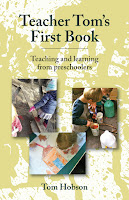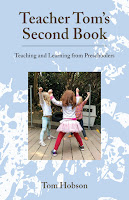"We Can’t Make Children Learn, But We Can Let Them Learn"
Public schools, since their inception, have been conceived as education factories. Having emerged alongside, if not as a product of, the Industrial Revolution, they adopted many of the processes being innovated during this move from largely agrarian and handcraft economies to industry and machine manufacturing.
It was during this time that we began to conflate education with schooling, or as as philosopher and social critic Ivan Illich wrote in his groundbreaking book Deschooling Society:
"They school them to confuse process and substance. Once these become blurred, a new logic is assumed: the more treatment there is, the better are the results; or, escalation leads to success. The pupil is thereby "schooled" to confuse teaching with learning, grade advancement with eduction, a diploma with competence, and fluency with the ability to say something new. His imagination is "schooled" to accept service in place of value. Medical treatment is mistaken for health care, social work for the improvement of community life, police protection for safety, military poise for national security, the rat race for productive work. Health, learning, dignity, independence, and creative endeavor are defined as little more than the performance of the institutions which claim to serve these ends, and their improvement is made to depend on allocating more resources to the management of hospitals, schools, and other agencies in question."
Whenever I read this, I'm reminded of a sister and brother who attended our school. As is often the case in a cooperative school where families come together to take part in the educational and social life of their children (in ways, incidentally, much more closely aligned with pre-Industrial Revolution practices), I became friends with the entire family, and so had the privilege of being part of their lives long after the preschool years. These were bright, creative, self-motivated kids, perhaps not the "best students," but certainly capable. As they moved into middle school, however, cracks began to show. One day, the older sister went into a mini-tirade about school as her brother chimed in his agreement.
"All they do is try to make learn all this useless stuff," she said, "We'll never need to know any of it." She went on to critique the whole of her school experience as a process of jumping through hoops devoid of meaning. She didn't use the word "irrelevant," but that was the gist of it. She went on to have a brilliant academic career, but she never lost her cynicism about what she was doing. She let us all know that she was just subversively "playing the game" so that she could get into the college of her choice: she earned her grades, she demonstrated she was well-rounded by filling her resume with interesting and varied extra-curricular activities, and she made sure to concentrate on her standardized test scores.
As she ranted, I recalled having a similar epiphany when I was about her age. Our own daughter had similarly learned to approach schooling as a cynic. Indeed, it can be seen as the most rational approach to such an alienating process, which is, in my mind tragic. A cynic is someone who has come to believe in an essentially selfish world, one in which the only thing that matters is self-interest. This is the horrible and inevitable result of trying to manufacture education (or health care for that matter): the best and the brightest come to understand success as grades, scores, and diplomas, while the rest, those not willing or able to play the game, are left to believe that they are incapable of "learning."
There's a well-known story about a businessman, a manufacturer of ice cream, who was invited to "inspire" a group of teachers. He gave his lecture, urging these educators to adopt the practices of excellence that could be discovered in businesses like his. He was feeling pretty good about himself until he reached the question and answer part of the program. A veteran teacher asked, "Do you make blueberry ice cream?"
"Yes, we do," he replied, "the best in the world."
"What do you do with the blueberries that aren't up to standards?"
"We throw them out of course."
"That's the difference between what we do and what you do," she replied, "We can't throw any of them out."
I like this story because it points out the ludicrousness of applying manufacturing processes to learning. When manufacturing ice cream, or anything for that matter, the goals is to mass produce a standardized product in the most efficient and profitable manner possible. That can't be the story of education. Humans cannot and should not be standardized. Indeed, it is impossible to standardize humans so our schools have done the next "best" thing, which is to standardize the process in the name of efficiency and to treat those who will not be standardized like those rejected blueberries. Oh sure, we try interventions and special programs designed to help them, but the goal isn't to help them become educated, but rather to make them more suitable to be used to flavor the ice cream.
Illich's critique of schooling is a critique of society and our penchant for trying to apply the principles of business and manufacturing in places where they do not belong. If the goal is a best-selling blueberry ice cream, then all is good, but education, like so many of the most important things, cannot be manufactured no matter how much we teach, test, grade, and certify. When we do this we create a society of cynics and rejects.
If our goal is learning, we must figure out a way to jump off the assembly line and re-imagine how we can best focus on the substance of education rather than the mere process. The only way I see to do this is to reject the manufacturing model altogether and perhaps instead learn something from the gardener, as envisioned by Alison Gopnik in her book The Gardener and the Carpenter. Our job is not to manufacture our children, but rather to provide them with water, sun, and soil so that they can grow:
"So our job . . . is not too make a particular kind of child. Instead, our job is to provide a protected space of love, safety and stability in which children of many unpredictable kinds can flourish. Our job is not to shape our children's minds; it's to let those minds explore all the possibilities that the world allows. Our job is not to tell children how to play; it's to give them the toys and pick the toys up again after the kids are done. We can't make children learn, but we can let them learn."
******
"I recommend these books to everyone concerned with children and the future of humanity." ~Peter Gray, Ph.D. If you want to see what Dr. Gray is talking about you can find Teacher Tom's First Book and Teacher Tom's Second Book right here.
I put a lot of time and effort into this blog. If you'd like to support me please consider a small contribution to the cause. Thank you!



